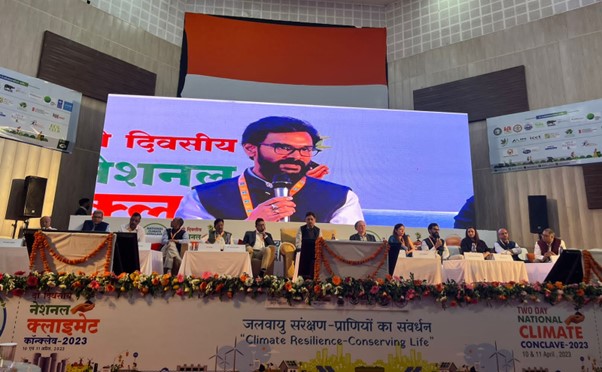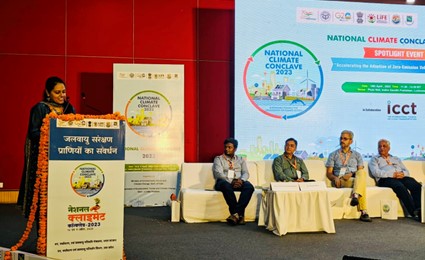
The National Climate Conclave 2023 was jointly organised by the Ministry of Environment, Forest, and Climate Change (MoEFCC), Govt. of India, and the Dept. of Environment, Forest, and Climate Change, Govt. of Uttar Pradesh, and National Centre for Sustainable Coastal Managemen (NCSCM), during April 10–11, 2023, in Lucknow, Uttar Pradesh. The two-day event focussed on the following two themes: a) Mobilising Sources for Requisite Climate Finance to Lead the Transition; b) Road to Resilience 2030: Innovative Approaches for Localising Climate Action. The Conclave was attended by dignitaries such as Shri Bhupender Yadav, Minister (E, F, and CC), Shri Yogi Adityanath, Uttar Pradesh’s Chief Minister, Shri Ashwini K Choubey, Minister of State (Environment), etc. They highlighted that India has been at the forefront when it comes to actions and initiatives in response to climate change. The two-day conference was attended by the government, CSOs, academic organizations, international bilateral and multilateral organizations, private firms, and start-ups. The Conclave provided an opportunity for early start-ups and local CSOs to showcase their impactful climate actions and provided exposure to various different instruments to attract more green finance.
Koyel Mandal, Chief of Programmes, Shakti, participated as a panelist in a session ‘Role of Philanthropic Organizations in Climate Actions’ where he said, “Now that India has committed to reaching Net Zero emissions by 2070, Shakti Foundation and other philanthropies are supporting State governments in designing and implementing sub-national climate actions to achieve the national goal and 2030 targets. States will have varied responses based on their growth parameters, resource availability and specific circumstances,” said Koyel Mandal, Chief of Programmes, Shakti. He highlighted that states play a critical role in achieving India’s short and long-term climate goals. He elaborated that philanthropic organisations work in various states across the country to synergise people-centric developmental approaches along with green growth and it is important to be mindful of the local circumstances.
Priti Shukla, Programme Manager, Electric Mobility, Shakti, participated in the spotlight event ‘Accelerating the Adoption of Zero-Emission Vehicles at Sub-National Level’ organised by International Council on Clean Transport (ICCT). The key takeaways from the event were: a) Multi-sectoral approach coupled with a technology roadmap will drive reduction in emissions of the transport sector in India. It is essential for Indian states to take action at the subnational level in order to expedite EV adoption. Through utilising their local expertise and resources, states can draw up policies and infrastructure that suit the local requirements and conditions, raise awareness surrounding EVs’ advantages, and collaborate with other communities to share successful approaches and promote adoption.

